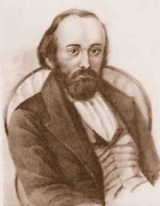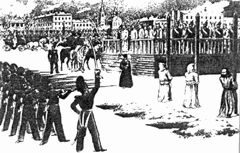
Mikhail Petrashevsky
Encyclopedia
Mikhail Vasilyevich Butashevich-Petrashevsky, commonly known as Mikhail Petrashevsky (–) was a Russia
n thinker and public figure.
Mikhail Petrashevsky graduated from the Tsarskoye Selo Lyceum
(1839) and Saint Petersburg State University
with a degree in law
(1841). He was then employed as a translator and interpreter
at the Ministry of Foreign Affairs. Mikhail Petrashevsky is known to have edited and authored most of the theoretical articles for the Pocket Dictionary of Foreign Words (1846), which popularized democratic and materialist ideas and principles of utopian socialism
. In 1844, Petrashevsky's apartment became home to social gatherings of different intellectuals, which would begin to take place on a weekly basis starting in 1845. These meetings were later dubbed as pyatnitsy (Fridays) and those attending them would be known as Petrashevtsy
. The latter came to Petrashevsky's house and use his personal library, which contained banned books on materialist philosophy
, utopian socialism, and history of revolutionary movement
s. Among the well-known members of the young intelligentsia who participated in the Petroshevsky Circle was author Fyodor Dostoevsky
. Mikhail Petrashevsky considered himself a follower of Charles Fourier
and spoke for democratization of the Russian political system and liberation of the peasantry with their lands. He advocated a long preparatory work among the masses for revolutionary struggle. In late 1848 Mikhail Petrashevsky took part in meetings dedicated to the creation of a secret society.
 In 1849, Mikhail Petrashevsky was arrested and sentenced to death. He, together with the other Petrashevtsy, was brought to the Semenovsky plats of Saint Petersburg, the usual place for public executions, and tied to the pole. At the last moment the execution was stopped and it was revealed that his sentence was exchanged for an open-ended katorga
In 1849, Mikhail Petrashevsky was arrested and sentenced to death. He, together with the other Petrashevtsy, was brought to the Semenovsky plats of Saint Petersburg, the usual place for public executions, and tied to the pole. At the last moment the execution was stopped and it was revealed that his sentence was exchanged for an open-ended katorga
. He was sent to Eastern Siberia
to serve his sentence. In 1856, Petrashevsky's status was changed to that of an exile settler. He lived in Irkutsk
, where he opened a newspaper
called Amur in 1860. In February 1860, Petrashevsky was exiled to the Minusinsk
district for speaking against the abuse of power by local government, where he died six years later.
Russia
Russia or , officially known as both Russia and the Russian Federation , is a country in northern Eurasia. It is a federal semi-presidential republic, comprising 83 federal subjects...
n thinker and public figure.
Mikhail Petrashevsky graduated from the Tsarskoye Selo Lyceum
Tsarskoye Selo Lyceum
The Imperial Lyceum in Tsarskoye Selo near Saint Petersburg also known historically as the Imperial Alexander Lyceum after its founder the Emperor Alexander I with the object of educating youths of the best families, who should afterwards occupy important posts in the Imperial service.Its...
(1839) and Saint Petersburg State University
Saint Petersburg State University
Saint Petersburg State University is a Russian federal state-owned higher education institution based in Saint Petersburg and one of the oldest and largest universities in Russia....
with a degree in law
Law
Law is a system of rules and guidelines which are enforced through social institutions to govern behavior, wherever possible. It shapes politics, economics and society in numerous ways and serves as a social mediator of relations between people. Contract law regulates everything from buying a bus...
(1841). He was then employed as a translator and interpreter
Interpreting
Language interpretation is the facilitating of oral or sign-language communication, either simultaneously or consecutively, between users of different languages...
at the Ministry of Foreign Affairs. Mikhail Petrashevsky is known to have edited and authored most of the theoretical articles for the Pocket Dictionary of Foreign Words (1846), which popularized democratic and materialist ideas and principles of utopian socialism
Utopian socialism
Utopian socialism is a term used to define the first currents of modern socialist thought as exemplified by the work of Saint-Simon, Charles Fourier, and Robert Owen which inspired Karl Marx and other early socialists and were looked on favorably...
. In 1844, Petrashevsky's apartment became home to social gatherings of different intellectuals, which would begin to take place on a weekly basis starting in 1845. These meetings were later dubbed as pyatnitsy (Fridays) and those attending them would be known as Petrashevtsy
Petrashevsky Circle
The Petrashevsky Circle was a Russian literary discussion group of progressive-minded commoner-intellectuals in St. Petersburg organized by Mikhail Petrashevsky, a follower of the French utopian socialist Charles Fourier. Among the members were writers, teachers, students, minor government...
. The latter came to Petrashevsky's house and use his personal library, which contained banned books on materialist philosophy
Philosophy
Philosophy is the study of general and fundamental problems, such as those connected with existence, knowledge, values, reason, mind, and language. Philosophy is distinguished from other ways of addressing such problems by its critical, generally systematic approach and its reliance on rational...
, utopian socialism, and history of revolutionary movement
Revolutionary movement
Revolutionary movement is a specific type of social movement dedicated to carrying out a revolution. Charles Tilly defines it as a social movement advancing exclusive competing claims to control of the state, or some segment of it. An example of a revolutionary movement is the Armenian...
s. Among the well-known members of the young intelligentsia who participated in the Petroshevsky Circle was author Fyodor Dostoevsky
Fyodor Dostoevsky
Fyodor Mikhaylovich Dostoyevsky was a Russian writer of novels, short stories and essays. He is best known for his novels Crime and Punishment, The Idiot and The Brothers Karamazov....
. Mikhail Petrashevsky considered himself a follower of Charles Fourier
Charles Fourier
François Marie Charles Fourier was a French philosopher. An influential thinker, some of Fourier's social and moral views, held to be radical in his lifetime, have become main currents in modern society...
and spoke for democratization of the Russian political system and liberation of the peasantry with their lands. He advocated a long preparatory work among the masses for revolutionary struggle. In late 1848 Mikhail Petrashevsky took part in meetings dedicated to the creation of a secret society.

Katorga
Katorga was a system of penal servitude of the prison farm type in Tsarist Russia...
. He was sent to Eastern Siberia
Siberia
Siberia is an extensive region constituting almost all of Northern Asia. Comprising the central and eastern portion of the Russian Federation, it was part of the Soviet Union from its beginning, as its predecessor states, the Tsardom of Russia and the Russian Empire, conquered it during the 16th...
to serve his sentence. In 1856, Petrashevsky's status was changed to that of an exile settler. He lived in Irkutsk
Irkutsk
Irkutsk is a city and the administrative center of Irkutsk Oblast, Russia, one of the largest cities in Siberia. Population: .-History:In 1652, Ivan Pokhabov built a zimovye near the site of Irkutsk for gold trading and for the collection of fur taxes from the Buryats. In 1661, Yakov Pokhabov...
, where he opened a newspaper
Newspaper
A newspaper is a scheduled publication containing news of current events, informative articles, diverse features and advertising. It usually is printed on relatively inexpensive, low-grade paper such as newsprint. By 2007, there were 6580 daily newspapers in the world selling 395 million copies a...
called Amur in 1860. In February 1860, Petrashevsky was exiled to the Minusinsk
Minusinsk
Minusinsk is a historic town in Krasnoyarsk Krai, Russia. It serves as the administrative center of Minusinsky District, although it is not administratively a part of it. Population: 44,500 ....
district for speaking against the abuse of power by local government, where he died six years later.

